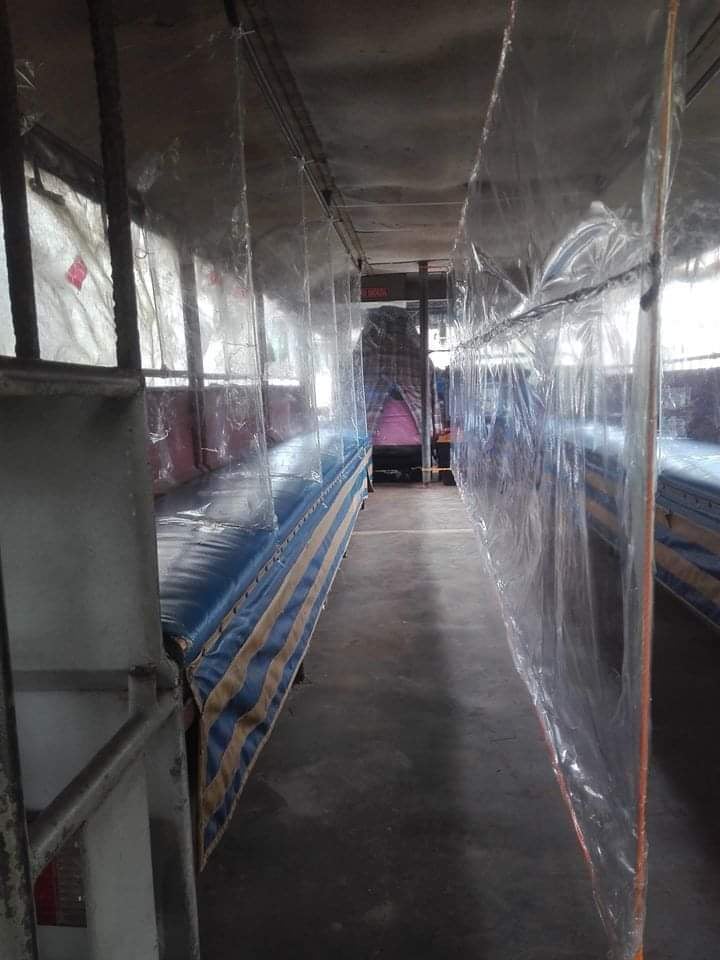
Prototype of plastic shields in a jeepney. | Photo Courtesy of Councilor Jerry Guardo
CEBU CITY, Philippines — As most parts of Cebu prepare to transition to general community quarantine (GCQ), special permits for public utility vehicles (PUVs) have not been granted yet.
Eduardo Montealto Jr., director of Land Transportation Franchising and Regulatory Board in Central Visayas (LTFRB – 7), confirmed this to CDN Digital.
Montealto said that although they had already received multiple applications for special permits from PUV operators, none of them had been granted so far.
He said most of those, who applied for special permits, still lacked the necessary documents before they could be given clearance to ply on the roads again.
“They lack documents pertaining to their insurance which is needed before they can operate again,” Montealto said.
He said that operators must also secure other clearances such as certification of roadworthiness from the Land Transportation Office (LTO), and ensure their franchises had not expired upon applying.
Montealto also said they would be prioritizing the issuance of special permits to vehicles with larger passenger capacities such as buses.
Last April 29, the LTFRB’s central office issued a memorandum containing the guidelines for public transportation in places under GCQ. They also released guidelines for Transport Network Vehicle Service (TNVS) and taxi operators
READ MORE: LTFRB releases guidelines for TNVS, taxi operators in areas under GCQ
It included a ‘standardized fare’ for all PUVs allowed to operate in these areas.
“It’s called standardized because this new fare matrix schedule will be applied to (all GCQ areas) in the country,” Montealto said.
Based on the memorandum, minimum fare of regular buses is at P11 for the first five kilometers, with a rate of P1.85 for every succeeding kilometer.
Air-conditioned buses, on the other hand, will be at P15 for the first five kilometers, and P2.20 for every succeeding kilometer.
Traditional public utility jeepneys (PUJs) are imposed with a P9 minimum fare, and a charge of P1.50 for each succeeding kilometer.
Both regular and air-conditioned modern PUJs will have a minimum fare of P11 for the first four kilometers.
The charge for every succeeding kilometer for the former is at P1.50 while it’s P1.80 for the latter.
While regular fares of PUVs in Central Visayas had been slightly lower compared to the ‘standardized matrix’, Montealto said this ‘could not be considered as an increase in the fare’.
“It’s not increased per se since we are just following a standardized fare matrix schedule that is applicable nationwide,” he added.
READ MORE: CV buses with new matrix can start implementing P9 minimum fare starting April 1 – LTFRB-7
ECQ in Cebu City and Mandaue City
In Cebu, only the cities of Cebu and Mandaue remained under enhanced community quarantine (ECQ) in compliance with the orders from the Inter-Agency Task Force for Management of Emerging Infectious Disease.
Read more: Mandaue, Cebu City remain under ECQ – IATF
The rest will be downgrading to GCQ in which public transportation is expected to operate again but in a limited capacity.
With Cebu City and Mandaue City still in ECQ, Montealto said routes of mini-buses in Cebu province, once issued with special permits, are limited.
“Buses covering the northern portions are not allowed to go beyond Consolacion while those in the south are barred from going beyond Talisay City,” he said.
Montealto also reminded both operators and passengers to continue observing health protocols even in transit, including the mandatory wearing of face masks when riding PUVs.
“We would like to remind our drivers and passengers to keep following the health protocols imposed by our local governments as protection,” he said. /dbs